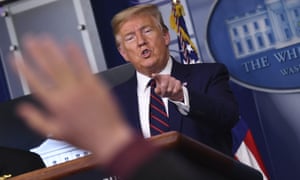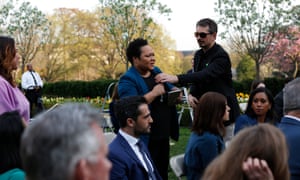The ABC News White House correspondent first met the 45th president in tabloid New York. His book is a cautionary tale

Photograph: Rex/Shutterstock
At a White House coronavirus briefing late last month, Donald Trump became visibly annoyed. Jonathan Karl, ABC’s chief White House correspondent, had pressed him about ventilator availability. The president snapped back with “don’t be a cutie-pie” and don’t act like a “wise guy”. This was not the pair’s first rodeo. Their paths first crossed back in the mid-1990s.
Back then, Trump was cementing his status as a tabloid legend and Karl was a cub reporter with Rupert Murdoch’s New York Post. As part of the real estate mogul’s perpetual circus, he granted Karl an interview about Michael Jackson’s honeymoon in Trump Tower. Meditate on that.
Now Karl has written a book. It is an attempt to capture the madness that is the Trump presidency and the danger to democracy it poses. Aided by measured prose and healthy skepticism, Karl succeeds.
Well-organized and respectfully written before the pandemic, Front Row at the Trump Show conveys the chaos and the characters that inhabit the president’s universe.
Also on display are Trump’s preternatural disregard for the truth – “Trump was a serial exaggerator long before he ran for president” – and his curious soft spot for the Confederacy, the losing and slave-holding side in the American civil war.
Front Row tells of a previously unreported White House meeting in the aftermath of the infamous 2017 far-right rally in Charlottesville, Virginia, and the murder of counter-protester Heather Heyer. Trump heaped hosannas on Robert E Lee, the defeated Confederate general, expressed sympathy for white nationalist grievance and compared himself to Abraham Lincoln.
Relying on three sources and contemporaneous notes taken by one participant, Karl writes that Trump told the meeting the Charlottesville protesters were unfairly treated and most had “good” intentions, driven to the streets by opposition to the removal of a statue of Lee. The infamous tiki torch parade – and its chants of “Jews will not replace us” – never really registered on his radar.
Instead, sitting at a conference table first used by Ulysses Grant, the Union general who won the war and became the 18th president, Trump opined that Lee was “the greatest strategic military mind perhaps ever” and also praised Thomas “Stonewall” Jackson, another Confederate general.
Karl also delivers his take on the White House staff. It is generally damning.
Sean Spicer, for example, never had any business working near the Oval Office. In Karl’s telling, the first Trump press secretary’s rage was not limited to the briefing room podium. In a pique, Spicer slammed his office door on Karl and his daughter. He later apologized.
Sarah Sanders, the president’s second press secretary, possessed a similar affection for “alternative facts”. She fabricated a tale about non-existent disdain within the FBI toward James Comey, which the special counsel’s report examined in detail.
And then there is Anthony Scaramucci, the Lady Jane Grey of White House communications directors. Karl presents Scaramucci drawing a phallic-shaped organization chart with him on top. In Karl’s words: “Scaramucci’s diagram looked like a penis. Not a propitious start for the new communications director.”
Those in attendance “struggled to keep from laughing”. Scaramucci lasted 10 days. Maybe 11.
Karl expresses sympathy for Trump over leaked conversations with foreign leaders but reminds the president his anger should be aimed at his staff, not the press. Likewise, Karl raps Jim Acosta of CNN for his confrontational style. In Karl’s view the media should not be the story.
Parenthetically, Karl worked at CNN before joining ABC. But Karl is also the president of the White House Correspondents’ Association and in that role he vigorously supported Acosta in the face of White House attempts to strip his press pass.
Underscoring the senselessness of Trump’s efforts, Karl reminds us that immediately after Acosta’s credentials were restored, Trump called on him. It’s not that bygones were bygones. Rather, the president can’t live without a sparring partner.
In the Age of Trump, being a reporter means having a target on your back. Karl describes Trump’s attempts to use the media as a foil and the resultant danger.
Angered by Karl during a pre-rally interview in November 2015, Trump stormed out and unleashed an obscenity-laced tirade. As a coda, the candidate enlisted the live audience by name-checking ABC, though not Karl himself.
“We were the villains,” writes Karl. “His crowds loved the attacks on the press, and he was about to give them more of what they wanted.”
Trump continued to pour gasoline on the fire, labeling the press the “enemy of the people”, a phrase embraced by dictators and tyrants. Karl fears “Trump’s war on truth may do lasting damage to American democracy”.
And this was before a global pandemic and the real possibility of economic depression.

The US leads the world in confirmed coronavirus cases, its death toll has exploded at a rate surpassing that of Italy. Unemployment has rocketed. In only two weeks, 10m jobs have been shed. They are not coming back anytime soon. Not exactly Maga. This is American carnage.
Yet Trump’s self-reverence remains. The president has proclaimed that he alone can save the nation. The press must ignore his lethal neglect.
Likewise, Trump expects us to forget that his administration undermined our national response and dithered over providing essential equipment to hospitals. To top it off, Trump denies personal responsibility.
In Gladiator, Ridley Scott’s Oscar-winning movie about ancient Rome, Gracchus, a senator, posits that the Emperor Commodus will offer the people bread and circuses even as he tramples on their lives and freedom.
“He will give them death,” Gracchus says. “And they will love him for it.”
These days, the sun is setting later. But darkness will be casting its broad shadow earlier. The president trails Joe Biden in trial heats but his poll numbers have risen. The election is seven months away: plenty of time for the president to rule and ruin. Karl’s trepidation is not misplaced.



